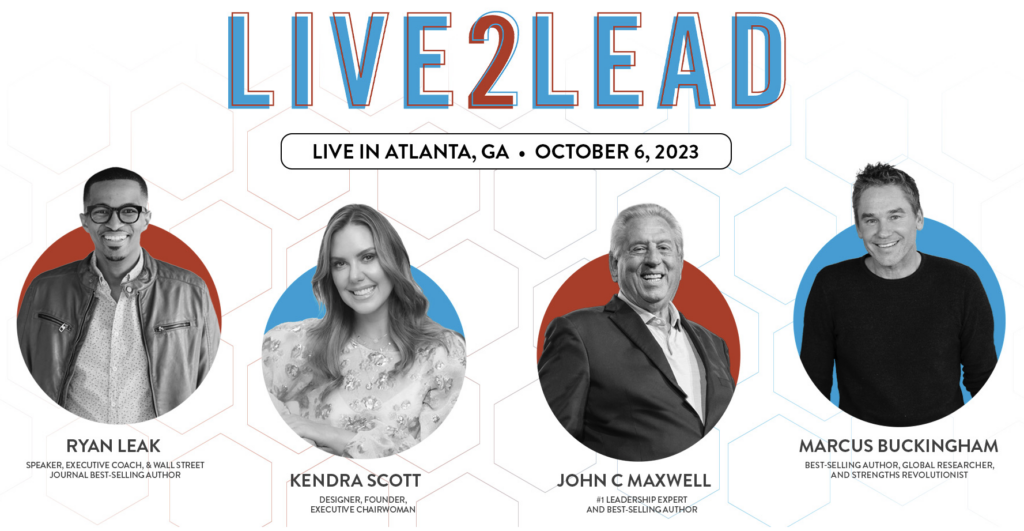Executive Podcast #258: When Leaders Live Out Their Values

In the 5 Levels of Leadership, we ask leaders to determine their top values. For many this is the first time they have ever considered what their values are.
But, if you are not aware of your values, and you are not intentionally living them out each day, you risk damaging the influence you have with others UP, DOWN, and ACROSS from you in the organization (and your home).
Do you have your tickets to Live2Lead? Use the code CLPODCAST at checkout to receive 10% off any tier ticket, plus an additional 10% off with General Admission ticket orders of 10 or more!
Download our Learning Guide for this podcast!
Chris Goede:
Welcome to the Maxwell Leadership Executive Podcast, where our goal is to help you increase your reputation as a leader, increase your ability to influence others, and increase your ability to fully engage your team to deliver remarkable results. Hi, I’m Perry Holley, a Maxwell leadership, facilitator and coach.
Perry Holley:
And I’m Chris Goede, executive vice president with Maxwell Leadership. Welcome and thank you for joining. Whether you’re listening to us, whether you’re watching us on YouTube, we’re just grateful for you joining us as we really just spend about 15 to 20 minutes and talk about what we’re hearing seeing in the field. Perry’s coaching, facilitating some of our other teams and just talking about it and sharing it with you. And so hopefully this is relevant information for you and your team. Before we get started with today’s topic, I want to just encourage you to go to MaxwellLeadership.com/Podcast. Now, when you go there, I want you to click on this episode and then you’ll be able to fill out the form in that episode that’s below there. If you have any questions, any thoughts, or we are rolling out a brand new course called Influential Selling, and it’s based around our five levels, methodology and all kinds of stuff. One of our executive facilitators and coaches has been behind the scenes, working hard on doing that. So man, if you have a sales team and you’re looking for a common language around sales and leadership and influence, then I want to encourage you to go and fill out that form. One of our team will both of.
Chris Goede:
Us coming out of sales. You know, that influence. If you have influence, you’ve got something.
Perry Holley:
People buy from people they like, right? And you got to be able to do that authentically. Well, today’s topic is when leaders live out their values. Values is a big part of what we do here at Maxwell Leadership. And really this is the integral part of the five levels of leadership. We believe that individuals, they have how they’re wired and they have learned behaviors, and then they have their values. And we’re going to talk a little bit about how many people need to understand this and they don’t know this. We often talk about in our world, in our bubble, that people just don’t know what they don’t know. Man, this is such an important part of your leadership and for you to not only know them, but to intentionally live them out and make sure that you’re aligned with them. And when you do that, I think you’ll increase your influence. Speaking of influence, up, down, across in your organization, and probably most importantly, especially as your kids get older, if you have kids at home, right? We’re passionate about this, but let’s talk a little bit about why you’re bringing this topic to our listeners today. Yeah.
Chris Goede:
And the five levels of leadership we talk at level one, we look at your personal values and it’s an exercise. Most leaders, when I’m operating it, very few people have taken the time to intentionally look at what are the values, what I’m communicating. And I call it the greatest leap in all of leadership is when a follower makes the leap from level one, I’m following you because I have to. You’re the boss. To level two, I’m following you because I want to. We call it permission. They give you permission to lead them. What would make anyone do that? Well, they’re watching you, and they’re watching you all the time. And they’re watching your actions, your reactions, your interactions. They’re watching your behaviors. Well, guess what drives that? That is driven by your values. And I just love the idea that I would learn what are my values, but then it goes a little not just knowing them is not the key here. Living them out and being true to what your values are in the hustle, hurry and mix of day to day business.
Perry Holley:
Yeah. And what I love about it is those values will drive your behavior. They are really the core of who you are. I like this comment you put in my notes here. As leaders, we’re broadcasting something we are always broad. What exactly are you broadcasting? And if you don’t understand your values and you don’t understand that core, here’s the deal. You are going to be broadcasting different things on different days, dependent on different decisions and pressures. And so what are those values that are going to drive your behavior?
Chris Goede:
Yeah. And before we talk about actually how to do that, I thought it’d be interesting just to make sure we’re clear on the outcomes of being this intentional about this. And I’m just finding that when I live out my values, it becomes the clarity and direction of the team, that it becomes easier for the people to really understand our company purpose, the goals, the vision, the direction. I gives them clarity. And, man, I love clarity that people here, we have a mission, we have our core values as a company, and it’s not real to people until they see it. I think that’s where a leader, one of the great outcomes here will be clarity for the team.
Perry Holley:
And what I love about that word clarity, not only is it clarity in the organization and the vision, I believe it’s clarity in how to communicate and connect with you as a leader. Right. Like, when you’re living by those values, you’re creating that clarity also for your team. Well, the other thing is an outcome that comes from this is increased authenticity. With this comes additional trust. And we talk about trust being the currency to all influence. And we believe that leadership is influence. And so when the people on your team know that they’re seeing the real Perry or they’re seeing the real Chris, they don’t have to worry about trying to figure know, playing this game. And what does Perry or chris want to know here and what are they thinking here? What does that look like? No, they just know that, man, Chris is authentic. This is the real you. And that’s what’s going to consistently show up. We say this often, consistency and leadership is not talked about enough. We need to make sure that we’re doing that. And then I love Greg Kegel, who brought this phrase to us years ago about how authenticity is a trust accelerator. So just tying that back together, man. If you understand these values and they drive your behavior as a leader, it.
Chris Goede:
Will increase your authenticity and it really leads to teamwork. And collaboration increases as well, because once you’re living your values and people know that they should be living theirs, you’re communicating from the front. You’re living by example to people that authenticity flows into the people. And now I want to collaborate with you. I want to team up. There’s none of this scarcity thinking. It becomes more of an abundant mindset. So the values, it’s a key accelerator to all these areas. I think it’s incredibly important.
Perry Holley:
Well, the first step you need to do here is you got to determine what your top five values are. I would love to tell you, hey, go back to the URL that I shared earlier and jump in that form. Tell them, hey, I want Perry and Chris to come. And we’ll do an entire day around five levels. And a part of that, not only for you personally, but for the team, is to go through an exercise that we have around your five values that may not be possible for you. So there’s all kinds of way to find leadership values, your values, personal values. Just google it, right? That’s the answer. Or ask, siri. Either way, just Google it and find out what those top leadership values are and then go through them. Now you’re going to go through them and you’re going to be like, oh, well, I value everything, or I value three quarters of the list. We get that. We understand that. But what we want to do and what we really work with teams and individuals and leaders is to get it down to three to five. We kind of stick on this five number of what are your top five values and that will guide your decision making. I call it a decision making filter. I know what my five are and I know that I’ve got to be in alignment with those, and those are how I base off making my decisions. Right. So there are resources out there. If you don’t have the opportunity to work with us or one of our coaches, you can find values, but go through that because you need to know what your top five.
Chris Goede:
It’s funny in class because we say, narrow it down to your top ten, and people start to weeping and gnashing of teeth of I can’t get it out of ten. Somebody’s throwing stuff at yeah, somebody says, Can I have eleven? Oh, yeah, absolutely. You can have eleven. You can never have twelve. Okay, I got twelve. I said, now take it down to five. Oh, my gosh, no, I can’t do that. But they’re going to all sound good to you. You’re going to want to have all of them, but you are only probably communicating a slight few. And I love something Brene Brown said that Dr. Brown and her research does a lot on values. And I’ll tell you why this really affected me was when I watch people making their choices, one of the values we put in the cards that we sort through is family. And I’ll be saying, take this 35 or 38 values and whittle them down to ten and put everything back in the box. Now take that ten down to five and put the rest back in the box. And we get down to the five. I noticed that, and I make a little light of it, and you guys get a laugh. But it said, nobody wants to be the person that throws family back in the box. It doesn’t seem right. You can’t possibly not have family in your top five. I don’t have family in my top five, and it bothered me, but I thought, I’d have a hard time demonstrating it by you look at my schedule and my travel and my time, I’m away. And I thought, how would you justify that? Perry but what Dr. Brown said was that you probably only have two core values, and those two core values inform they serve your second tier values. And when I look at my five and then thought about my second tier values and family is definitely very important to me. Family is everything to me. It’s why I do what I do.
Perry Holley:
Right.
Chris Goede:
But my top two values really serve family. So I really like that to be thinking as you’re going through that, they’re all going to sound good. They’re not going to all apply. Some of them are aspirational I see people do that all the time. Well, I really put down creativity, but I really want that to be true, but it’s not yet. Okay, then feel free to recycle that and get another one to do that.
Perry Holley:
That is awesome. All right, so once you decide that, and I hadn’t heard that, I need to go back and relook at mine and say, okay, well, what are those two? That kind of drive everything else. So I love that. But let’s say this is your first experience with this, or maybe not, but you haven’t done this next step, which we want to encourage you to do, which is, hey, write a descriptive statement that explains the behavior that explains of that value, of what that’s going to look like. Why is that important to you? And then what is the behavior that drives out of that? So I’m going to give you an example of mine. I’ll give you one example and then throw it back to you. But one of my top five is I haven’t determined if it’s top two. Now, you’ve challenged me in this last little bit of conversation, but my top five is teamwork. And it’s important to me because I just really believe in the collaboration that all of us is better than one of us. And one of the images that I tie to this value is a football huddle, right? And you look at the huddle of eleven individuals that have different skill sets, that have different backgrounds, that have different communication skills. All of it, it’s different. And what’s fascinating about that is some of those individuals cannot perform the other roles inside that huddle. So I’ll just pick on myself for a minute. I played offensive line growing up, and so the speed is not and the ability and the agility is maybe not where it needs to be. Matter of fact, one of my favorite statements of a college offensive line coach I had one time was like, I don’t care what you run the 40. And I was like, Praise God.
Chris Goede:
Yes.
Perry Holley:
He’s like, What I care is what happens within five yards. Now, you’re not going to see Chris split out in the slot or wide receiver on the team. I can’t do that, nor can they come in and do what the linemen do. And so I just grew up around that. And so it’s one of my top five values. I also believe that that is key in organizations and in teams and culture inside organizations. And so that is why it’s so important to me. Now, the evidence of that behavior is me is that any, most all decisions, I’m getting feedback from the team, I’m getting their perspective. I want to do things together. I would love to travel together. Right? I create this collaboration as a team, not only at work, but also I love to do it at home as well, and with the family. And so I have this little phrase that I tie to this value, which is individual responsibility, collective pride. And if you really think about that, that explains teamwork to a T. All of that, the last 6120 seconds of me talking about teamwork, really comes from the fact that I went through this exercise years ago and I understood what my top five values are and then what are images tied to it, and why do I believe that? And so that drives my behavior as a leader, as a husband, as a dad, whatever that might look like. And that’s the power of understanding what your values are.
John Maxwell:
Hello, this is John C. Maxwell. I’ve been teaching leadership for over 40 years. We’re gathering in Atlanta for our 10th live to lead leadership Conference Friday, October the 6th. And I want to personally invite you to join us live to Lead is about empowering you to live out leadership, not just learn it. World class leaders Kendra Scott and Marcus Buckingham and Ryan Leake will be joining me to impart wisdom, inspire change, and help you lead more effectively. Hey, bring your team. Groups of ten or more receive a significant discount. So let’s grow together. Because leadership isn’t a solo journey. It’s best experienced in community with others. Visit Live2Lead.com today and let’s make leadership a lived experience.
Chris Goede:
So the exercise Chris is suggesting is that you go through the value, find a list of leadership values that you like, go through those and sort those down to maybe three to five. That really resonate with you. But then the magic is to do a couple of things. Why is this value important to me? And two, how would you see it evidenced in my behavior? And why that’s important is I talked about the greatest leap. We talk about values at level one. Why? Because people are watching you and they’re going to decide, am I going to give you permission to lead me? If yes, they’re going to see be something. What are you broadcasting? It’s usually from your value. So for me, I would say the number one value that I’ve done this exercise many times, it always comes out my number one value is growth. My number two value was courage. It always plummets me about why that would be. But growth, it’s important to me because and you have a statement with yours. My statement is one that John taught me, which was, I cannot give what I do not have. And you will see my growth, high value of growth, evidenced in my daily routine. I have a non negotiable morning routine that says I’ve got to be pouring into me so that I can go onto this podcast, into that classroom, into that keynote, into that blog post, and pour into you. And it’s very clear to me, and people say, how do you get up and do that every day? Because it is my number one value in doing that. So when you do the exercise that Chris is suggesting, I think you get really granular on why it’s important to you and how would we see it, because people are going to see in you and decide, I think I’m going to give you permission to lead me. And that’s level two.
Perry Holley:
Yeah. And I’m going to build off that example for just a minute. When you talk about growth being your number one, the behaviors that you have lead to the consumption of content. And I say all the time, Perry consumes more content probably in a week than I do in a month. And I’ll never forget early on, I was like, yeah, I’ll keep up with you.
Chris Goede:
Yeah. What are you reading?
Perry Holley:
And I was still on the same book a quarter later, and Perry had already gone through twelve other books. But just your ability to pull out and to reference when you talk about you cannot give what you don’t have. You’re able to give that to. I’ve seen you do it in keynotes and trainings and with me personally, and you just have it in there because you’re committed. And that behavior that you have to growth, and it’s your top value.
Chris Goede:
I’d add an epiphany, though. I don’t think I’ve ever heard you share that that teamwork is a real high value for you. And I thought even just yesterday, I was in another city and doing something, and you sent me a text about, hey, we got this client did this. And I go, yeah, they reached out. We did this. I told Lori, Lori did this. And you said team. The team was out in front of me. Yeah, I love the team. It called to. Your high value of team was the individual. What do you say? Individual.
Perry Holley:
Oh, yeah, individual responsibility. Collective pride.
Chris Goede:
Right? And you had the collective pride because the individual loved it, but you built that team. So I love it.
Perry Holley:
Yeah, that’s great. All right, so once we have these values defined and you’ve identified what the behavior is, right? So just off building off Perry’s example, one of his behaviors is a non essential is that anything is going to get in the way of his morning routine, and so he’s going to focus on growth there. Okay, so once you have that and the behavior identified, here’s what we want you to do four things that you can look into every single day to make sure that you’re living this out. Number one, embrace your values daily. Okay? What are you doing on a daily basis? It’s who you are. It is who Perry is. His consumption of content and growth is part of his daily routine. Number two, compare your values to your actions constantly. Make sure that there is alignment. We talked earlier on about, okay, perry could not say, hey, growth is my number one value, and yet then not do anything to consume any type of content, whatever that might be. Audible reading, going to conferences, asking questions, all those things drive growth, right? And so we got to make sure that we’re living that out and our actions are in alignment with what our value is. Number three, live out your values regardless of your feelings. I’m sure there are times that Perry does not feel like opening up a book or another article or watching YouTube or whatever it might be, unless it’s around grilling out and using your smoker. I think you always have time in that area. Woodworking yeah, that’s right. And then finally, number four is we want you to evaluate each day in the light of your values. At the end of the day, is there integrity in how you lived out that day? Did you spend time reflecting on that day? Right. You’re going to have a ton of experiences, but the best way to learn from those experiences is to evaluate them. So when you evaluate them say, does my behaviors align with the values that I have and how I acted in that moment?
Chris Goede:
I love that. And I think number three you mentioned, regardless of how you feel, is going to be so important in the many challenges that we face. But you’ll say one of my high values is integrity. And you’ll be amazed that when you declare that and write that down. How many I just asked the group this the other day. What is it in your day to day that where a customer, a client, a business partner or somebody in your team causes you to question integrity going to be in play here. And that what challenges your integrity. And that’s a high value. I’m going to have to live that. And I love the number four about reflecting on it. How did I do today? If I said I was communicating growth and courage? One of mine I’ve found is really values change over time. As I’ve gotten older legacy has become a real value to me. And wisdom probably wasn’t a value when I was 25 had been. But now it’s key that people are looking to me for wise guidance and I want to be that guy. So I value it very much. And so I’m looking how did I live out those three to five things today? And I think you do that, you’re setting yourself up for success and you get those outcomes that we talked about at the very front.
Perry Holley:
Yeah love that. Well, as I wrap up, here’s what I love about this. We start off by saying today we’re going to talk about when leaders live out the values, their values. What I love about this is that if you live these out, not only is it going to increase your influence, but then I think it gives you the credibility, gives you the right to then challenge your team to go through the same exercise. And here’s what we know. We know that when your team as a leader, when your team or those that are peers to yours or your family, when they know that you value what they value, so you’re seeking out what they value, they are going to value being a part of your team and your organization at a higher level. And that is an intangible way for you to add value to those that are in your influence. And here’s the other thing. Remember Perry and I talk about this. You are wired a certain way. You have learned behaviors from past experiences that you bring to the office every day. And that third one that’s so important is that you have values and you need to know that. Your team needs to know that. So now that we’ve talked through this and hopefully you’ve gone through and done some of this work, now we want to encourage you to go out and do the same thing with your team.
Chris Goede:
You can’t not be communicating something through your actions. You might as well be doing it intentionally.
Perry Holley:
That’s right.
Chris Goede:
Letting know with that. Well, thank you, Chris. And just a reminder, if you go to Maxwelladership.com slash podcast, you can leave us a comment or a question. You can learn more about our offerings. You can also begin to see some of our family of other podcast offerings that are there. Love for you to check those out. And we’re so grateful that you would join us with this time, and we love hearing from you. So go see Maxwellleadership.com/podcast. That’s all today from the Maxwell Leadership executive podcast.
To be a Successful Leader, You Need Feedback on Your Leadership.
We’re excited to announce our new and improved Organizational Effectiveness Survey (OES). The OES gathers feedback from employees to give leaders and management the knowledge and action plans needed to develop a more effective and productive work environment. Our new version measures 4 areas of your business: Leadership, People, Strategy, and Performance.














Be the first to comment on "Executive Podcast #258: When Leaders Live Out Their Values"